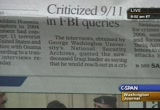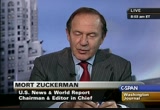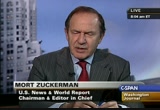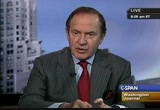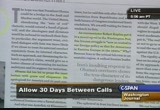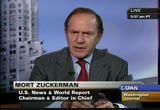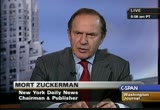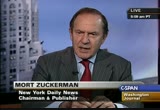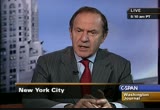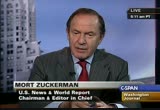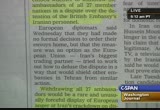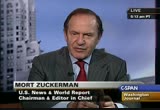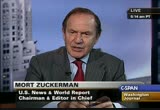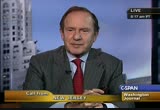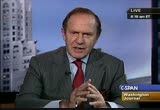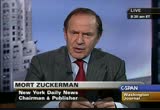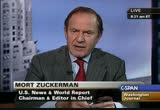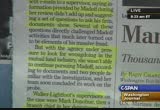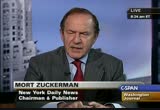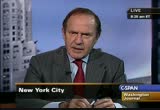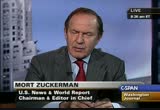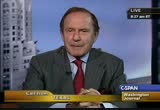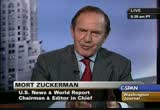tv [untitled] CSPAN July 2, 2009 8:00am-8:30am EDT
8:00 am
no governor causes this crisis. this is a national issue with usually driven down tax revenues. obviously, it plays out in the political sphere as well lead the economic sphere. host: thank you for being here. >guest: folks should take a look at our web address. www.cbpp.org. please look at our site for new report we've put out. host: in a few minutes we will speak with more zuckerman joining us from new york city. >> president obama will meet with a group of business leaders and a few hours at the white house. later the president makes remarks in the rose garden on corporate innovation. north korea test fired two short-range missiles today. this according to south korea's defense ministry. the missiles were fired from the eastern coastal city.
8:01 am
more on afghanistan this morning, thousands of u.s. marines and helicopters and armored vehicles are moving into a taliban controlled villages in southern afghanistan. the first major operation under president obama's strategy to stabilize the country. ho[captioning performed by national captioning institute] [captions copyright national cable satellite corp. 2008] .
8:02 am
headline on this version of it by eli lake. saddam denied bin laden ties. he told his captors in 2004 that his country condemned the attacks of 9/11. the interview's obtained by george washington national security archives quoted the now deceased iraqi leader saying he'd reach out in a crisis with china and north korea rather than to bin laden whom he called a zealot. what do you think? guest: that he was fearful of iran and he wanted to have that as an implicit threat vis-a-vis
8:03 am
iran. he didn't want iran to observe the destruction of all of its weapons of mass destruction capabilities earlier on. so what it all goes to is we misjudged what was going on in iraq and this is what led to the war in iraq, which was in a sense something that took place within the heightened concerns in the country after 9/11. and so it just goes to show you that these things are never as clear as we thought they were. and it's unfortunate because the country paid a huge price for that. host: well, put that into greater perspective for citizens who are listening to that on a week when troops are beginning major pullout in iraq. and all of the national treasure and spilled blood that's gone into this cause. >> yeah, it's been a huge cost for the united states and not just in terms of treasure but, of course, we lost many
8:04 am
soldiers, we -- more than anything else lost the confidence of the country. the government lost the confidence of the country in its foreign policy decisions and i think that anxiety over what the government may decide or not decide to do is something that i think is still a big part of our present politics. i mean, the bush administration for good or for ill was almost completely discredited primarily as a result of the war in iraq and the assertion that they had weapons of mass destruction which they refused to deal with in an appropriate way that prompted us to go to war in iraq. i'm not sure that was the real rational but be that as it may that was the public rationale. saddam hussein was so unpopular in iraq. they would -- 2/3 would have voted to go to war because they
8:05 am
didn't like saddam hussein. now you have a democratic ascendency in the congress and in the white house and it's real quite unique, probably hasn't happened since the 1930's. this is an enormous impact on this country and on the credibility of the government. there is such a relief that there is a new administration in and they have been given a great deal of shall we say leeway in terms of their assertions. i'm not sure this is going to be sustainable. and i believe a year from now we'll have a more normal presidency in which the administration is going to really have to fight in a very different way for its legislative and political successes. host: mort zuckerman has two media holds. here's how you reach him. republicans can dial 202-737-0001. our line for democrats, 202-737-0002. and our line for independents
8:06 am
is 202-628-0205. you can also send us an email or a twitter message if you'd like and we'll mix all those in during our discussion with him. your latest opinion piece is about u.s. policy toward iran. it's just come out today. and the headline is "the u.s. needs handshakes and an iron fist." you've chosen to wrote robert kaplan where he said this iranian struggle is "now as central to our foreign policy as that for democracy in eastern europe in the 1980's." why did that appeal to you? >> because the great threat to the united states and to the stability of -- guest: because the great threat to the united states and to the stability of the national community really comes out of the muslim world. and parts of the muslim world that are really viewed by a sense of shall we say religious
8:07 am
commitment and some would say even fanatic simple but their efforts are provoked by very deep set of religious beliefs that are very difficult to sort of engage in because we are not in that cultural mode as a country. we separated church and state a long time ago, but you have religious leadership particularly now in iran that is very scary. and they have clearly taken over the dominant role in iran. whatever hopes we may have had from the uprising that we saw graphically on many television screens and read a lot about has proven to be totally inadequate to the forces against them against the grand ayatollah and ahmadinejad. and they now control a government which is benefiting from good oil prices, which is
8:08 am
sort of the expansionist muslim country which is threatening the sunni countries, it being a shiite country, which is sponsoring terrorism all around the arab and muslim world. you may recall not too long ago because i happened to be in that country shortly after it was made public that a hezbollah cell was uncovered in egypt. and the purpose of that hezbollah cell was to blow up ships in the suez canal and to blow up sort of major tourist sites. these being the two major industries for egypt. and the hopes that the economic decline that would ensue would destabilize the mubarak regime and bring in the muslim brotherhood which is much more closely affiliated with iran and with hamas. so you have a sense amongst the sunni countries of an expansionist iran operating through proxies, through hezbollah, through hamas.
8:09 am
the leader of hamas actually publicly stated that he wanted the egyptian military to rise up against the mubarak government, and their hopes for a succession. mubarak being 82 or 83 right now. i don't know which. you have a situation now it's not just in egypt. it's true in the suddenan. it's true in lebanon. it's true in the hezbollah community. it's true in iraq where we're facing a lot of shiia-inspired activities. being a shiia country, we don't know where maliki comes out in terms of that particular struggle when the united states forces pull back from the industries and may over a two-year period ultimately leave iraq completely. and we may be faced with a different kind of political access in that part of the world which tell -- let's not forget -- controls major
8:10 am
sources of energy, oil and natural gas, which is critical to the industrial world of the west. they have tremendous control over us. if they are in the hands of religious radical leadership we will have extraordinarily complicated worlds to cope with and contend with. so we are in a very, very different period now. i think one of the most dangerous periods, and i believe that obama's foreign policy legacy will be determined on how he handled iran which is at the forefront of the forces that says the united states is the great satan. we don't know how to cope with that kind of the world during this stage of the game. obama's policy seems to be an assumption of good will and charisma and rhetoric. the charisma and rhetoric coming from obama. and what he calls a handshake, if they offer an opened hand instead of a clenched fist has not worked.
8:11 am
his strength and the way the boiks spoke respectively -- obama administration spoke respectively of this regime in iran has not diminished the radicalism of that regime and their antipathy towards the united states. the question is, how do we deal with a country like that? they are really trying to expand their influence all across the muslim and arab world. it is terrifying the sunni-arab countries including saudi arabia, egypt, jordan, all of whom see a sort of a sarpetishes effort on the part of iran to develop terrorist networks within their own countries and destabilize them in one form of another and we don't know how we're going to cope with all of that. and it's a very serious threat to the fundamentals of the western economies. host: giving our viewers a lot to reflect upon and to -- and
8:12 am
this is from this morning's "new york times," the europeans discuss joint iran response. alan cowell and stephen castle, the reporters from iran. european officials discussed weather to withdraw the ambassadors of all 27 member nations in a dispute over the detention of the british embassy's iranian personnel. withdrawing all 27 ambassadors would be a rare and unusually forceful display of european -- let's begin with telephone calls. we'll begin with a call from virginia. this is sandra on our independent line. go ahead, sandra. caller: yeah, i've been watching this for quite a while in iraq. when bush wanted to go in, the u.n. inspector that was in charge said there was no weapons. he had tired. he ended up quiting and they put in another u.n. inspector.
8:13 am
and during that time, if you watched the news during the day you have one story that they had weapons of mass destruction. if you watched the news at nighttime they were saying, no, they didn't have any and they were gone. and they had already been disposed of. so, i mean, come on. all right. thank you. guest: well, i think if i interpret your comment correctly, your suggestion is that there is a parallel between the false information on which we relied when we went into iraq and what we believe might be coming of iran in terms of weaponry. i don't think there is any denial at this stage of the game that iran is pursuing everything up to the point of what they call breakout capacity where within a short period of time they can develop nuclear weapons. nevada already been test firing long-range missiles which are the delivery systems for nuclear weapons. they have been quite open about
8:14 am
the amount of sentry fugse and their ability to -- centrifuges and their ability to develop low enriched uranium. they are going to have high enriched uranium by next year to develop nuclear weapons. if that's the case we'll have a serious problem on our hands. and what we've been trying to do with iran to engage with them so they would not get to that point because their regime clearly is not the one that you would want to trust with nuclear weapons and the deliverable nuclear capacities which the long-range missiles would give to them. now, the real problem there is that in order to be able to force them to do something we would need the kind of sanctions, frankly, that we imposed on iraq back in 1991 which were sort of catch-all provisions in which both economically and diplomatically and otherwise financially that
8:15 am
might put the kind of pressure on them where they would be willing to engage. it makes not just the united states nervous. it makes the europeans nervous. on one level it would make the russians nervous. they would like to have a crisis in iran because it would raise oil prices in iran. which is what russia needs to bail out their economy. and secondly, the two largest producers in the world of natural gas are russia on iran, and they would like to have, shall we say, a cooperative relationship with them in terms of fixing natural gas prices because the whole russian economy rests on energy prices. and they have suffered a catastrophic economic blow as a result of the collapse of energy prices at a time when they had gotten way too much debt on their books, both privately and through their government. so we don't have the capacity either with russia or china, both of whom have basically indicated they will not support the kind of sanctions regime
8:16 am
that we need, particularly through the u.n., in order to pressure iran to cease and desist from this kind of -- discyst from this kind of weapons capacity. we are in a very difficult situation to do. this country does not want to go to war with iran, but if iran does develop nuclear weapons there will be a huge change in the global shift, and it will be against the united states and against the west and nobody knows quite how to deal with that. and the bush administration tried one approach which not only did it prove to have a false premise which is that saddam hussein had nuclear weapons and weapons of mass destruction, which did prove for false as the previous speaker suggest, but whatever else the impact may be, it has really undermined the confidence of this country in those kinds of ventures. at some point we may have a real issue to deal with instead of what turned out to be a phony issue to deal with.
8:17 am
this is what we pay presidents to make wise decisions on. host: thank you. next telephone call is from new jersey. this is mark, republican line. caller: good morning. you have two news outlets. i believe this argument on whether or not iraq had or didn't have weapons of mass destruction is misleading. i mean, iraq had the chemical capacity. they had warheads which they never disposed of for their weapons of delivery systems. they had illegal missile systems and everything else. and i believe in my personal own belief is that the liberal media has portrayed this as a further denouncement of the bush administration for in my belief a positive policy. iraq had weapons of mass destruction. all they had to do is mix the chemicals and use the warheads and use the rockets. guest: i don't want to reargue this whole issue at this stage
8:18 am
of the game. one could come up with various conclusions as to iraq's weapons of mass destruction capability. i do think as you know when our inspectors went through that whole country and investigated something like 283 sites that we had on the list of where they had potential weapons of mass destruction capability we found very, very little evidence to support that. this doesn't mean that we didn't think that it was there, that saddam hussein didn't want the world to think they had it, that in fact they had used chemical weapons against the kurds, that they had used chemical weapons against their own people so there was some credibility with his threat. and after all, they did have the nuclear reactor which the israelis blew up in 1991. so there was that rational basis for assuming that they had some capacity. the fact that unfortunately for us was that we had inadequate intelligence. it was a huge intelligence mistake, but i will also say
8:19 am
the u.n. inspectors left a report which i read in great detail in which they outlined as you were implying all sorts of unacknowledged supplies of chemical weapons and biological weapons which had not been in a sense answered to and answered by the iraqis. so there was some legitimate case. in the end it turned out they didn't have anything near the kind of capacity that would have justified going to war in order to eliminate that kind of capacity. at least at not at this stage of the game. therefore it undermined the credibility of the bush administration and the whole war in iraq. never mind that the war in iraq was terribly badly managed for all kinds of reasons that we don't have to go into. so iran may be a very different situation, but the same kind of skepticism that exists in the american public today may transfer to iran, and iran clearly is doing a lot of things that are very, very, very difficult for us to deal with. and for the muslim and arab world to deal with, namely,
8:20 am
trying to undermine regimes that don't in a sense follow their line. they are certainly trying to undermine the regime in lebanon. they are certainly trying to do it in egypt. they are certainly trying to do it in sudan. and there is a sort of export of a coined of radical muslim -- kind of radical muslim belief. by the way, saudi arabia has a large role in that because of their export of the wahabi dimensions of islam which many people think is a fairly radical regime. but it's something we have to find, we as a country and the west as a group of countries are going to have to find some way to deal with and to particularly if it turns out that iran's regime is as radical as they sound. and they do have the weapons of mass destruction, even without using them, it will give them immense power throughout the
8:21 am
region. nobody is going to want to take iran on if they seize several of the smaller gulf countries that do also have oil capacity. i'll give you an example. qatar is a country that has become completely subservant to iran. their news media, al-jazeera, is influential throughout the world. they are fearful of an attack of iran. there are small countries. they have very limited military capabilities. they do have a lot of energy. and the question is, are they going to follow iran's lead in one form of another rather than be taken over by iran in one form or another? and how are we going to cope with that? because these are not issues that are going to cause the united states as a country to stand up and say we have to go to war against this country. there was' no real appetite for that in this country. there may be that kind of an appetite in some sort of foreign policy circles who deal
8:22 am
in this kind of hard edge realism. but we do have a burgeoning problem here and there's no way of escaping it. we can't talk it away. host: we are going to change topics on you here. we're already halfway through your discussion with you. and i want to show the audience what "the new york daily news" looked like after bernie madoff's sentence. big front-page story. listed as the pariah. rarely in memory has a man become such a planetary pariah. not a single person, no member of his family, no friend of a lifetime stepped forward to attest to madoff. they have warned of madoff. lawyer raised alarm and was pointed elsewhere. this is zachary goldfarb's piece. they warned superiors as far
8:23 am
back as 2004 of irregular parking lots that bernie madoff's financial firm, but was told to focus on unrelated matter, according to agency documents and sources familiar with the investigation. genevievette walker-light foot, a lawyer in the s.e.c.'s office, suggested a set of questions to ask the firm. several questions directly challenged madoff's activities that turned out to be elements of his massive fraud. with the agency under pressure to look for wrongdoing in the mutual fund industry, she wasn't able to continue pursuing madoff and two people familiar with the investigation. this is a personal story for you. you were among those who were hit with madoff's scams. what's your reaction when you hear this story today in the "post"? guest: my only hope with
8:24 am
respect to the 150-year sentence, madoff a name that could never have been made up to describe his own activities. my hope is he'll live every year to live out that 150-year sentence. i had never mattered of bernie madoff. i suffered some substantial financial plosses because one of the people who've now being sued by the attorney general of new york state for civic fraud, a man by the name of merckan, ran a fund which was supposed to be a fund to various kinds of investments. he put the vast bulk of those in with madoff. whatever that relationship is. and he's being sued by andrew cuomo, the attorney general of the united states. i happened to be one of the others that's suing for misrepresentation and fraud. so i give you that by way of background. listen, i do think what
8:25 am
happened with madoff is a real statement of default on the part of the s.e.c. under chris cox. it wasn't only this particular moment. this was one of the other moments when it should have been brought up to a level where he would have been properly investigated but a man by the name of harry marcopolis, whom i never heard of until this all exploded, presented a 17-page analysis of madoff's alleged form of investing and proved it could not be done. he went i think to the s.e.c. four or five times. the s.e.c. was in the mode in those days of basically letting whatever financial world was under their supervision and review to run amuck. i mean, the one thing that was even more important than that was when they basically allowed the investment banking firms to go from a leverage that's a debt to equity ratio to 12-is
8:26 am
to as much as 30-1 to 40-1. that overwhelming amount of debt in relationship to equity which was a major contributor to the financial crisis that we are now going through. and so the whole regulatory system not only to cover fraud but to cover even worse, to regulate legal activity, was dramatically inadequate to the challenge at that time and to the management of an intelligent financial world. we are now paying a huge price as a country as a result of that. president obama is coming forward with a new system of financial regulation. certainly whatever it is that comes forth has got to improve on what we had before because the danger that we face now in an economy where the functioning of the financial system is critical is that we'll have another collapse. we must avoid that at all costs. the madoff thing is one aspect of it and the failure to
8:27 am
regulate the financial world properly is another. host: for mort zuckerman, next call is from dallas. caller: good morning and thank you for taking my call and for mr. zuckerman, i have been listening to you for a while, previously, you know, on different programs. but you answered my question about why we went into iraq. i thought about this. if the energy was the reason and we haven't gotten anything from it, why are we still there? because afghanistan is where we need to be. can you answer that question? guest: i'm not sure i can answer that question because i'm not sure it's easy to give you an answer as to why we are still there.
8:28 am
we are under agreement to withdrawal our forces from the cities as of just this the last couple of days. and we are going to withdraw all those forces. not, i might say, to the thanks of grateful iraqi population but it's a celebtory kind of thing because they're comparing the withdeprall of american forces to the withdrawal of the british in 1920 and 1921. but the british were a colonial power and we are not a colonial power. we did not go there to take over that country and exploit that country. we did go there in the defense of that country. we thought from a tyrannical and cruel dictator whom we were fearful might have nuclear weapons which he could then feed off to terrorist groups and in any event to gain a threat to that region. so we are going to be pulling back. and in two years we're supposed to withdraw all of the troops in that country. we do have a problem in afghanistan. i'm not sure if our problem in
8:29 am
afghanistan is the taliban. the taliban is a whole mix of various tribal forces. the real problem is al qaeda, and al qaeda is now primarily sort of concentrated in certain parts of pakistan rather than in afghanistan. but we have now -- it's what happens all the time and in so many things, not just in politics and in war but in business where people make a commitment and they feel, you know, i've sort have made the commitment, how do i get out? but there is no doubt but there is a radical group there, and they are -- they are totally hostile to the west. and they see us really as a group that has corrupted their religion and corrupted their societies and exploited their societies and they're determined to find some way to eject us in many ways. and if they were just willing to stay within the boundaries of their own country, it would be one thing. but as we have
123 Views
IN COLLECTIONS
CSPAN Television Archive
Television Archive  Television Archive News Search Service
Television Archive News Search Service 
Uploaded by TV Archive on

 Live Music Archive
Live Music Archive Librivox Free Audio
Librivox Free Audio Metropolitan Museum
Metropolitan Museum Cleveland Museum of Art
Cleveland Museum of Art Internet Arcade
Internet Arcade Console Living Room
Console Living Room Books to Borrow
Books to Borrow Open Library
Open Library TV News
TV News Understanding 9/11
Understanding 9/11

